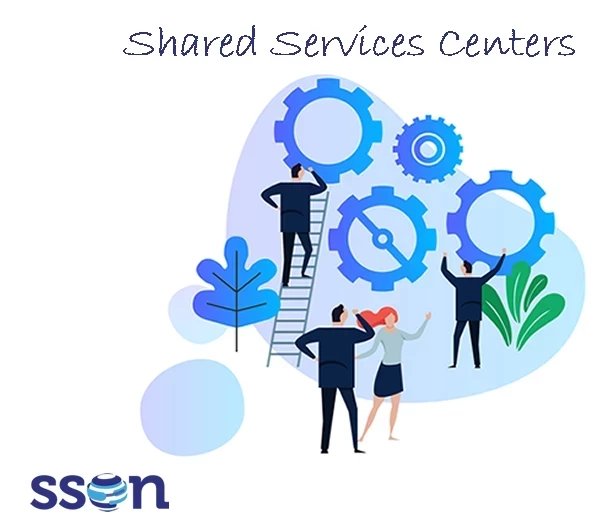
The Shared Services Centre (SSC) is often viewed as a cost centre, a necessary business function, but one that doesn’t drive value. Nothing could be further from the truth. SSCs contain pockets of potential value that you can find and capture with the right technology. That tech is process mining.
SSCs combine the people, processes and technology for general business functions into departments, such as Accounts Payable, Accounts Receivable, Procurement and IT. By centralizing these tasks, organizations can standardize operations, reduce duplication across the business and benefit from economies of scale.
Companies across industries have adopted SSCs because of these centralization benefits. Yet as organizations evolve and grow, the web of interconnected processes that drive the business, many of which flow through SSCs, also get more complex. This complexity creates fertile ground for value opportunities. With process mining, SSCs can find and capture this value by reducing costs, optimizing business performance and solidifying relationships with vendors, customers and suppliers.
Shared Services Centres in India
India is a preferred location for shared service centres, according to a 2021 report from Deloitte. In the report, over 600 leaders from SSC organizations and parent organizations ranked India as the top preferred location for SSCs across multiple industries.
Deloitte’s findings were echoed by a February 2023 report from the National Association of Software and Service Companies (NASSCOM) and Zinnov. According to the NASSCOM-Zinnov India GCC Trends Quarterly Analysis for Q4CY2022, 58% of new GCCs were from US-headquartered multinational companies (MNCs). In Q3CY2022, this number was 76%. The NASSCOM-Zinnov report also notes that between FY2015 and FY2021, the GCC market in India grew at a compound annual growth rate (CAGR) of almost 11%.
Shared Services Centres are even more critical during economic uncertainty
During COVID-19, the businesses that flourished were those that transformed quickly, deploying new technology and automating processes. SSCs played a key role in these digital transformations, adopting new methods of work and solutions to improve efficiency, cut costs and drive greater value for customers.
Even as the effects of the pandemic wane, the world faces a period of extreme macroeconomic headwinds, driven by inflation and geopolitical instability. Businesses around the world need to reduce costs as quickly as possible. SSCs are under more pressure than ever before to reduce cost exposure and boost purchasing power.
Inside every organization are pockets of untapped opportunity. And as an org grows, more and more cost-saving opportunities are generated. SSCs are the perfect always-on magnets for finding and capturing these value opportunities, if they have the right tech.
Shared Services Centres benefit from process mining
Shared Services Centres were made for reducing costs, and they are good at it. Unfortunately, the typical methods SSCs use to cut costs are too slow and resource heavy. Hiring consultants and manual process mapping may deliver cost reductions, but at too high a price. Process mining gives SSCs a fact-based, holistic view of their end-to-end operations, allowing them to identify and achieve key efficiencies and in turn reduce back office costs.
According to a 2022 Everest Group report, SSCs and Global Business Services (GBS) organizations are “strong candidates” for process mining. By leveraging process mining, companies can “monitor and optimize” operations in near real-time. For common GBS services, such as accounts payable (AP) and accounts receivable (AR), process mining can improve important KPIs such as on-time payments, SLA compliance, working capital and lower late payment dues. Process mining, the report’s authors say, can enable Global Business Services to accelerate their digital transformation and deliver strategic benefits to the enterprise.
Process mining enables SSCs to work in a completely new way. Instead of trying to reduce costs, improve service and ensure compliance by throwing more people at the problem, process mining acts as an X-ray for processes. It shows you how your processes actually run, finds the hidden value opportunities and extracts that value automatically and continuously.
By using process mining, SSCs can deliver against the strategic objectives of cost reduction, improved service quality and better process compliance. For example, process mining can improve your first time right rate by detecting purchase order (PO) discrepancies. It can reduce days sales outstanding by automating recurring activities and simplifying tracking and reporting. And, it can eliminate duplicate payments by proactively detecting duplicates and preventing unnecessary payments.
Because process mining enables the analysis, benchmarking and standardisation of processes at scale, it is a critical technology for SSCs as they operate across regions, business units, service lines and functions. For example, SSCs can track the entire Order-to-Cash (O2C) value chain from order management to billing and Accounts Receivable (AR). Process mining provides complete end-to-end process visibility and offers intelligent insights from each functional step thereby improving overall performance, facilitating great collaboration and better change management.
Celonis, the industry leader in process mining, has its India HG in Bangalore, a hotspot for SSCs in the country. Working with some of the world’s largest SSCs, including TCS, Wipro, Tech Mahindra, and Infosys, Celonis helps companies increase process efficiency and optimise resources like never before.
In a 2021 report, Celonis outlined the financial impact of common problems that process mining can uncover. Celonis compared an average company to the top performing companies against core KPIs for accounts payable, accounts receivable, procurement and order management. For the average (i.e., benchmark) company, Celonis assumed $5B in revenue, an average order price of $1,500, sales orders of 3,333,333, purchase orders of 3,000,000 and a total supplier spend of $2.4B. Celonis determined this benchmark company was missing out on $567 million in working capital and $105 million in cost savings by not performing at the same level as the most efficient organizations.
Inside even the best run businesses across every industry, there are pockets of untapped value opportunity like the ones illustrated above. Unfortunately, due to the complexity and rigidity of the ERP, CRM and SCM system across which most processes run, those opportunities can be difficult to identify and act upon. Process mining layers over SSC’s existing tools and systems, allowing them to find and deliver the value opportunities hiding in and between their processes. Simply put, process mining empowers shared service centres to reduce cost in a way that is efficient, guaranteed and faster than ever
(The author is Ms. Anitha Scaria George, Vice President, Vice President India COE and Country Leader at Celonis, and the views expressed in this article are her own)








